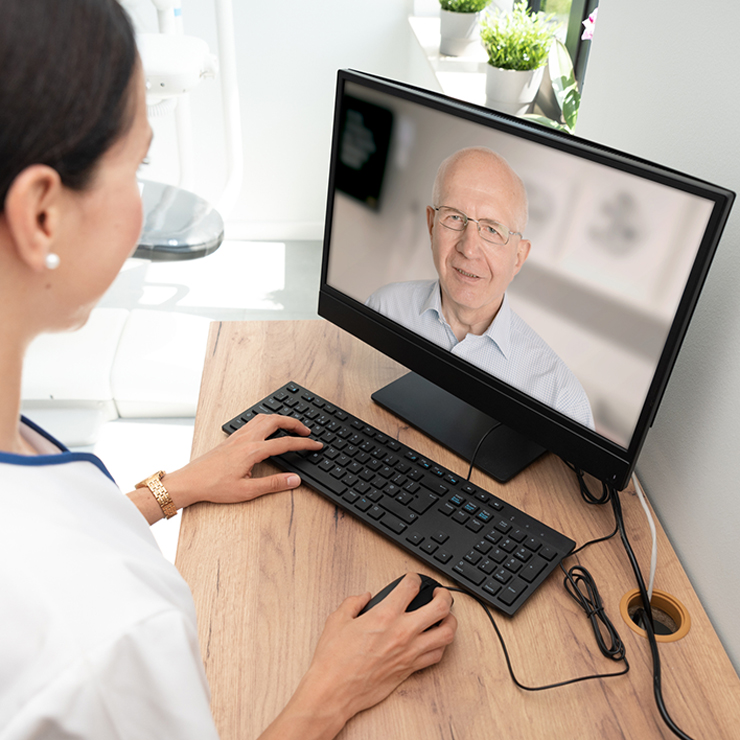 The integration of technology into long term care is revolutionizing the way we approach this delicate and crucial stage of life. Being an executive in the senior care space for decades, I've witnessed firsthand the profound impact that technological advancements can have on enhancing the quality of care, communication, and comfort for patients and their families. From innovative medical devices to sophisticated data management systems, technology is not just a tool but a transformative force that is reshaping the landscape of long term care.
The integration of technology into long term care is revolutionizing the way we approach this delicate and crucial stage of life. Being an executive in the senior care space for decades, I've witnessed firsthand the profound impact that technological advancements can have on enhancing the quality of care, communication, and comfort for patients and their families. From innovative medical devices to sophisticated data management systems, technology is not just a tool but a transformative force that is reshaping the landscape of long term care.
This proactive approach to long term care not only improves patient outcomes but also alleviates the stress and anxiety often experienced by families, knowing that their loved ones are under constant, attentive care. Technology's impact will be significant on the efficiency of care delivery, but also in upholding the dignity and preferences of those at the end of their life, making the journey as peaceful and respectful as possible.
Revolutionizing Patient Monitoring and Care Delivery
Wearable devices and remote monitoring systems enable the continuous tracking of vital signs such as heart rate, blood pressure, and oxygen levels, providing health care providers with real-time data that can be crucial in detecting early signs of distress or deterioration. This level of constant vigilance allows for timely interventions, which can significantly improve patient outcomes and enhance their quality of life. For instance, a sudden drop in oxygen levels can be immediately addressed with supplemental oxygen or medication adjustments, preventing further complications and ensuring the patient's comfort.
Telehealth has also emerged as a game-changer in long term care, particularly in reaching patients in remote or underserved areas. Through virtual consultations, patients can access specialized care without needing stressful and often difficult travel. This not only provides them with the best possible medical advice but also ensures that they remain in the comfort of their own homes. Telehealth platforms enable continuous communication between patients, families, and health care teams, keeping everyone aligned and informed about the patient's condition and care plan.
Enhancing Pain Management and Comfort
Innovations such as smart drug delivery systems, which can administer precise doses of pain medication based on real-time assessments, are transforming traditional approaches to pain relief. These systems can adjust dosages automatically, responding to fluctuations in a patient’s pain levels without the need for constant manual intervention by health care providers. This ensures that patients receive the right amount of medication at the right time, minimizing pain while reducing the risk of overmedication and its associated side effects.
AI and machine learning algorithms are also being employed to predict and manage pain more effectively. By analyzing data from various sources, AI can identify patterns and anticipate pain episodes before they become severe. This proactive approach allows for preemptive adjustments in pain management strategies, ensuring that patients remain comfortable, and their pain is controlled. Additionally, virtual reality and other immersive technologies are being used to provide patients with non-pharmacological methods of pain relief and relaxation.
Personalizing Long term Care through Data and AI
The utilization of data analytics and artificial intelligence in long term care is paving the way for highly personalized and effective treatment plans. By harnessing vast amounts of patient data—from medical histories and genetic information to real-time health metrics—AI algorithms can identify unique patterns and trends that inform individualized care strategies. These insights enable health care providers to tailor interventions precisely to the needs and conditions of each patient, ensuring that care is not only more effective but also more respectful of the patient's personal preferences and medical history. For example, predictive analytics can help identify patients who may benefit from early palliative care interventions, thus enhancing their quality of life sooner rather than later.
AI-driven decision-support tools are also revolutionizing how care plans are developed and adjusted over time. These tools can process complex data sets to generate recommendations for symptom management, medication adjustments, and other critical aspects of care. They provide health care professionals with actionable insights that go beyond traditional clinical guidelines, allowing for more nuanced and responsive care. This level of personalization ensures that long term care is dynamic and adaptable, meeting the evolving needs of patients as their conditions change. Additionally, data-driven approaches can facilitate more meaningful conversations between health care providers, patients, and families about treatment options, ultimately supporting more informed and compassionate decision-making.
Ensuring Ethical and Compassionate Care
Incorporating technology into long term care necessitates a strong commitment to ethical standards and compassion. While technological advancements offer tremendous benefits, it is crucial to ensure that they are used in ways that uphold the dignity and autonomy of patients. Consent and privacy must be prioritized when collecting and utilizing patient data. Clear, transparent communication about how data will be used and the potential benefits is essential in building trust with patients and their families. Additionally, ethical frameworks must guide the development and implementation of AI and other advanced technologies to prevent biases and ensure equitable care for all patients, regardless of their background or socioeconomic status.

Compassion must remain at the heart of long term care, even as we embrace technological tools. Technology should enhance, not replace, the human touch that is so vital during this sensitive time. Health care providers must continue to engage with patients and families personally, offering empathy, understanding, and emotional support. Technologies like telehealth can facilitate these connections by enabling more frequent and meaningful interactions. Still, the essence of compassionate care lies in genuine concern and respect for the patient's experiences and wishes. Balancing technological efficiency with ethical considerations and compassionate practices ensures that long term care remains holistic, humane, and centered on the patient's well-being.
As we continue to navigate this evolving landscape, our ultimate goal must be to provide care that is not only technologically advanced but also profoundly humane.
Melissa Powell is president and COO of The Allure Group.